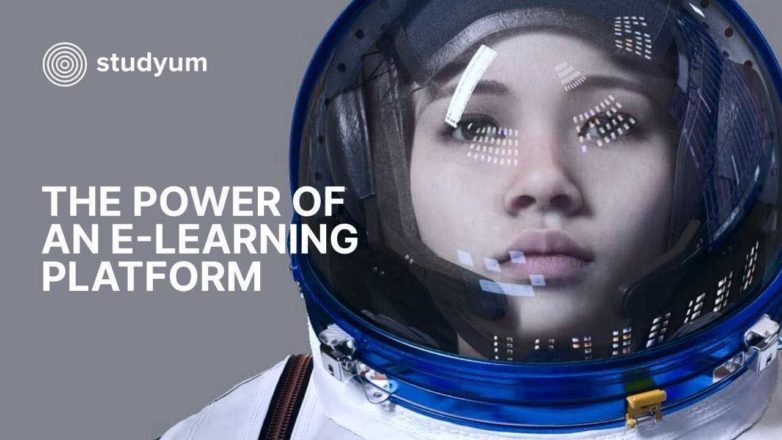Studyum: The Power of an E-Learning Platform
Studyum is a decentralized e-learning platform.

Share this article
E-learning has become one of the most popular ways for people to advance their careers from the comfort of their homes. This should come as no surprise—with just a single online course, learners can acquire an in-depth knowledge of extremely niche fields.
One of the most widely used models for e-learning combines micro-learning techniques with a certification program that adds to the course’s weight. However, times are changing. Technology is evolving rapidly, with some of the most cutting-edge advances like blockchain technology, artificial intelligence, and virtual reality exploring all kinds of use cases across industries worldwide.
The e-learning space is finally finding its feet. As of 2020, the industry was worth $250 billion, and statistics suggest a projected growth of $1 trillion by 2027. The world of education is undergoing a fundamental shift, and the industry is witnessing some of the most innovative projects adapting technologies to push the space forward. Studyum is one such project, having adapted some of the most advanced technologies to create better learning experiences for its users.
What is Studyum?
Studyum is an e-learning platform that’s focused on becoming the most optimized online education model to date. Specifically tailored to a Millennial and Gen Z audience, the platform incorporates personalized training through facial recognition, 3D avatars, NFT-based trading, and gamification. Blockchain technology has expanded its utility to all kinds of use cases, and by using decentralized networks, Studyum is revolutionizing the e-learning space.
Studyum’s dedication to using the most advanced technology puts learners at the center of their journey, boosting engagement and helping them focus. With some of the world’s top educators, coaches, and experts, Studyum offers an all-new approach to studying. Its ecosystem involves an NFT reward system, gamifying the process to keep users motivated and encourage them to achieve their goals. The idea is to design the right way of learning for each student, opposing the prevalent generalized learning models.
Advancing Online Education
Studyum aligns its personalized, 3D content with each user’s preferred mode of learning. Using machine learning and blockchain technology, the platform promotes accountability and consistent and efficient progress. Based on a scientific approach, Studyum gives users unique teaching methods focused on developing neural pathways, as well as:
- An interactive virtual learning experience through augmented reality and machine learning tools
- Microlearning techniques to help cover complex topics using a divide-and-conquer learning strategy
- Gamification of goal-setting, and a reward-based infrastructure to incentivize students to keep going
- A platform that adapts to each student’s learning style, including characteristics like frequency, performance, and goals
- A personalized app experience and dashboard for every learner
Studyum’s Native Token: STUD
On joining Studyum, users are assigned a STUD token wallet, which is used for all transactions on the platform. Every starter wallet is given a small amount of STUD sufficient for initial purchases. Studyum also uses this token for airdrops and bounties to attract more early adopters and encourage the token’s use within its ecosystem.
For content creators signing up with Studyum, the platform also has plans to mix fiat with its native STUD token to distribute and diversify rewards. This gives content creators an opportunity to monetize their content and help create long-term appreciating token value.
Using Self-Determination Theory (SDT) in E-Learning
Studyum’s system aims to adapt to the needs of the student instead of the other way round. One way through which it manages to do this is by relying on a well-researched, popular psychological concept coined by Edward Deci and Richard Ryan in 1975 – Self-determination theory. Self-determination theory, or SDT, implies there are three main elements that amplify the learning process and make it meaningful and fulfilling: autonomy, relatedness, and competence.
- Autonomy: As the LMS sees more activity from learners and educators, its vault of information will grow. This will give users far more options for the kinds of subjects they want to learn, giving them as much control and autonomy to design their learning path as possible. However, if users don’t need that level of control, they can also rely on the pre-configured settings to meet their end goals.
- Relatedness: The days of incompatible students being randomly placed into study groups are over. With the advent of advanced, AI-powered e-learning solutions like Studyum, users can easily form communities that match their interests, level of commitment, and learning preferences. Learning is a lot easier with equally enthusiastic friends.
- Competence: There is an optimum level of difficulty that pushes learners in the right direction. If a problem is too hard, the learner gives up. If it’s too easy, they get bored. Studyum has found a way to balance the level of challenge in the learning process, maintaining students’ intrigue throughout entire courses of instruction. It also recommends the level of difficulty based on the student’s past performance, giving them a chance to adjust the complexity of challenges as they see fit.
With so many e-learning projects showing up, Studyum is proving to be leading the revolution with its high-tech features, robust partnerships, and grand yet realistic vision of e-learning. This careful cocktail of artificial intelligence, blockchain, and 3D design is bound to push e-learning into an exciting, futuristic era.
Share this article
